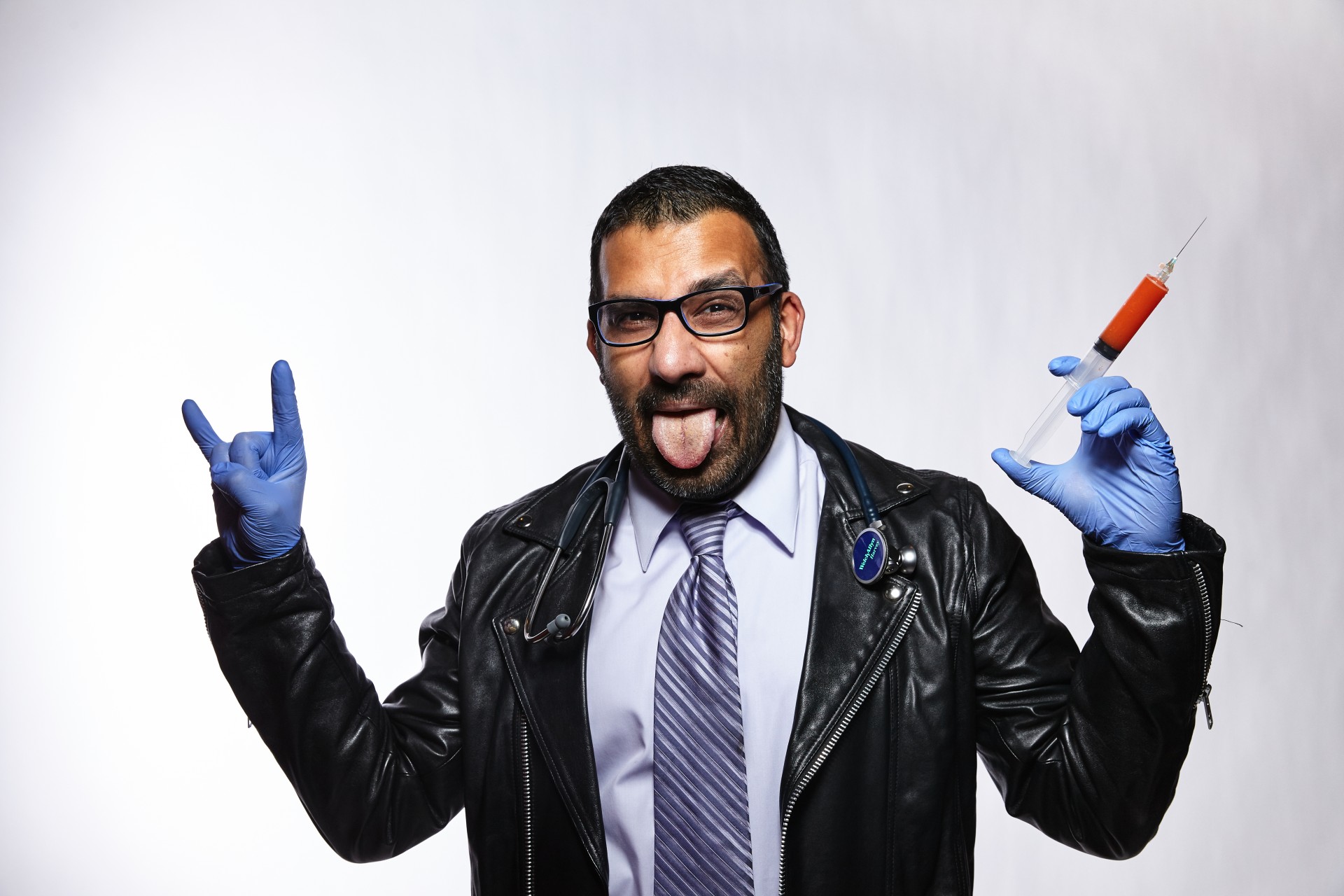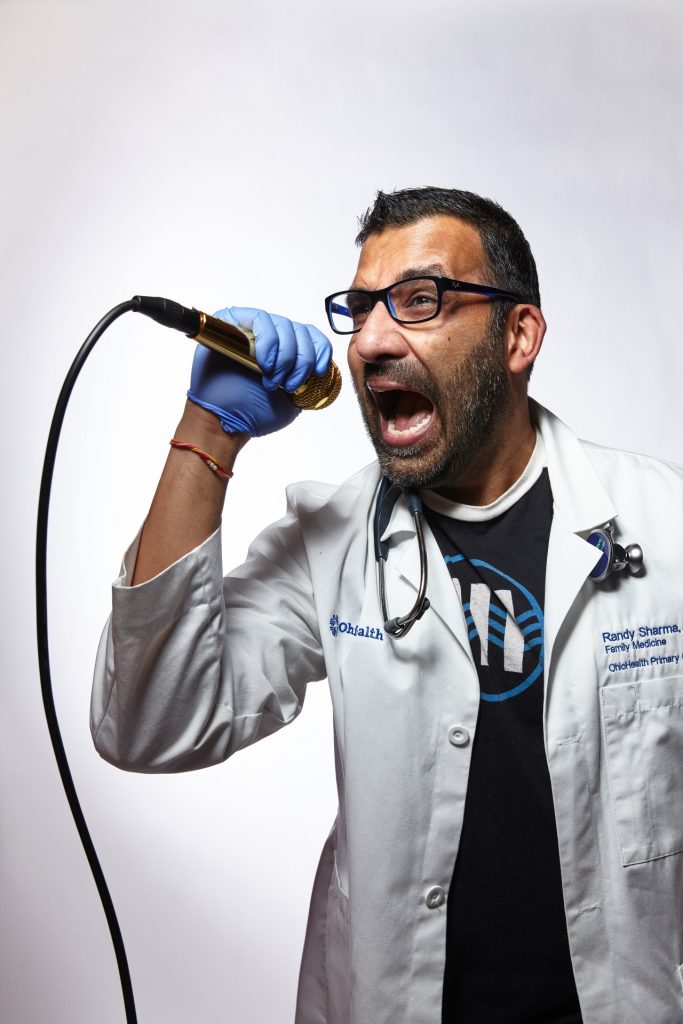The Interview Issue: Randy Sharma, physician and rock & roll devotee

When Randhir (Randy) Sharma was a young kid, he was self-admittedly, a science geek. When he was in the second grade, he was fascinated by a story he saw on the news of a man who received an artificial heart transplant. But it was on a family trip to India when he was in the fourth grade that the emotional and humanitarian aspects of medicine coalesced with the clinical side of medicine. Walking through the streets of New Delhi with his mother, Sharma saw a young boy, with no legs who was pushing himself on a scooter, begging for change. His mother gave the boy some money, but the incident left Sharma in tears. He realized something at a young age that would resonate throughout his life:
“You have to help people out if you have the opportunity. You just have to.”
Sharma points to this encounter as a catalyst for why he wanted to pursue a career in medicine. “If you don’t do it for the right reasons, you’re not going to be happy, and your patients will not be happy either.”
Originally from the Cincinnati-Dayton suburb of Springboro, Sharma found himself immersed in the middle of a burgeoning alternative music scene the summer he graduated high school, thanks to the breakthrough success of now alt legends Guided By Voices, and The Breeders. Sharma would go to their shows, and subsequently, befriended members of the bands.

“The Breeders had blown up, and Guided By Voices were kinda starting to do some things. They were playing Canal Street Tavern in Dayton, and it was an 18 and up show. [Ed. note: sharma was 17 when he graduated high school.] I had to take my brother’s ID because he was older than me. I met Bob Pollard [vocalist and lyricist for GBV] after the show and he was like, ‘We play basketball at my house every weekend. You should come hang out!’ So I would go and hang out with Bob, and Kim Deal [bassist for the Pixies, and co-founder of the Breeders], and Jim Greer, who was the editor of spin Magazine, and Kim’s boyfriend at the time.”
As a result of early encounters and experiences like this, Sharma is immune to being starstruck. He also started an ongoing love affair with music, particularly going to see live shows. Sharma finished his undergrad at the University of Cincinnati, and attended Wright State University for medical school. After completing his three-year residency program at Riverside Methodist Hospital and then moving on to private practice, Sharma has been proud to call Columbus home for the last 15 years.
Through attending shows at local venues and getting to know people within the business, he was able to parlay his career in medicine into his love for music.
“Honestly, I think it’s going to enough shows—you just get to know people. I had become friends with several people at CD 101 who would call and say they had someone that needed taken care of…. I would get know them, their management, and the folks at Promowest, too.” Because of his demeanor, and his familiarity with celebrity, local venues have designated Sharma as a go-to physician, should a touring act need some sort of basic medical care, thus earning Sharma nickname “The Rock Doc.”
In what any fan of live music would call a stroke of brilliance, he plans his vacations around shows and festivals he wants to attend, such as Austin City Limits, and the Secret Solstice in Reykjavik, Iceland. The latter is where Sharma became a little part of history in 2017 when he was part of a select group that attended the first concert inside a volcano. What Sharma refers to as the best experience of his life was also quite harrowing. As a result of severe weather, the group that attended the performance was left stranded on the volcano and had to be rescued by the Coast Guard.
Whether it’s Sharma’s charity work with Columbus performer Nina West, and Steve Weaver from the Candle Lab (they co-founded a charity to help HIV patients who cannot afford the astronomical fees of their medication), or his relationship with CD 102.5, Sharma has quietly become an integral part of what makes Columbus such a unique, vibrant, and continually diverse city. That diversity runs deep for Sharma. The younger of two sons from immigrant parents, his father came to America looking for a better life for himself and eventually made his way to Ohio.
“My parents are from India. My dad moved here in 1970 with nothing really but his education. He’s a civil engineer. He went to England and got his master’s degree there. Around this time, some restrictions were being lifted immigration-wise, and they were looking for skilled people to come in. Someone he knew told him, ‘If you get the opportunity to go the United States, you should go.’ So he did.
Of course, he shows up in New York, with very little money, and somehow, somebody that he knew from home knew somebody that lived in Cleveland, and he moved there. They were great to him; they let him stay there. The guy actually might have been a stereotypical Quickie Mart owner, to be honest; and my dad was having a tough time finding a job, and told the guy he would just work at this store. The guy was like, ‘No you won’t, you’re gonna get a job. You have a degree, that’s why you’re here. So we’ll take care of you.’ ”
But Sharma’s father persevered. “Eventually, my dad worked his way into a job with ODOT [Ohio Department of Transportation] down in the Lebanon area, near Kings Island. At some point, my grandmother was diagnosed with liver cancer some time after my grandparents moved to England. So, he’s stuck here, and her dying wish was to see him get married. So, he went back to India when he got a little time off work and had an arranged marriage. And that was not too long after my dad first moved here because my brother popped out in ‘73, and then I came along in ’76.”
The fact that Sharma loves his work, and gets to marry it with his passion for music is envious as it is admirable. He not only gets to help people—which is why he choose a career in medicine—but he gets to develop relationships with some of the artists as result of his work and his passion for music.
When asked if he would be able to do this in New York or Los Angeles (where the bulk of these artists reside and frequent), he was adamant that it would be impossible. He points to an accessibility in Columbus, and his relationships with CD 102.5 and the venues.
“The greatest thing about Columbus, to me, is the sense of community. When something happens, if there’s some sort of tragedy, people pull together. Whether it’s the arts community or the music community, it’s everybody coming together. Whether they are donating their time, or money; it makes it really easy to stay in an area when you can say, ‘Hey, you know what? I’m worried about this issue,’ and I can reach out to people that actually want to help. During our entire conversation, the example that best illustrates his credo of, “You have got to take care of people,” as well as being the Rock Doc, is when he arranged for his sister-in-law to meet her favorite musician, Jason Mraz. His sister- in-law is battling cancer and was unable to attend her favorite musician’s concert as a result.
“I don’t call in favors for myself, but I do like to do it for other people. She was going through this very rough spell, and I just reached out to a friend of mine, who happens to work with him. I didn’t even know she was such a huge fan, but somehow it came up, and I was like, ‘Hey, listen, my sister in law, she’s really sick, she’s a big Jason Mraz fan, I saw he’s coming here in December… Is there anything you can do?’ His friend arranged for tickets to the concert as well as a private meet and greet with the artist.”
There’s that credo again.
You have got to help people.
BROUGHT TO YOU BY


